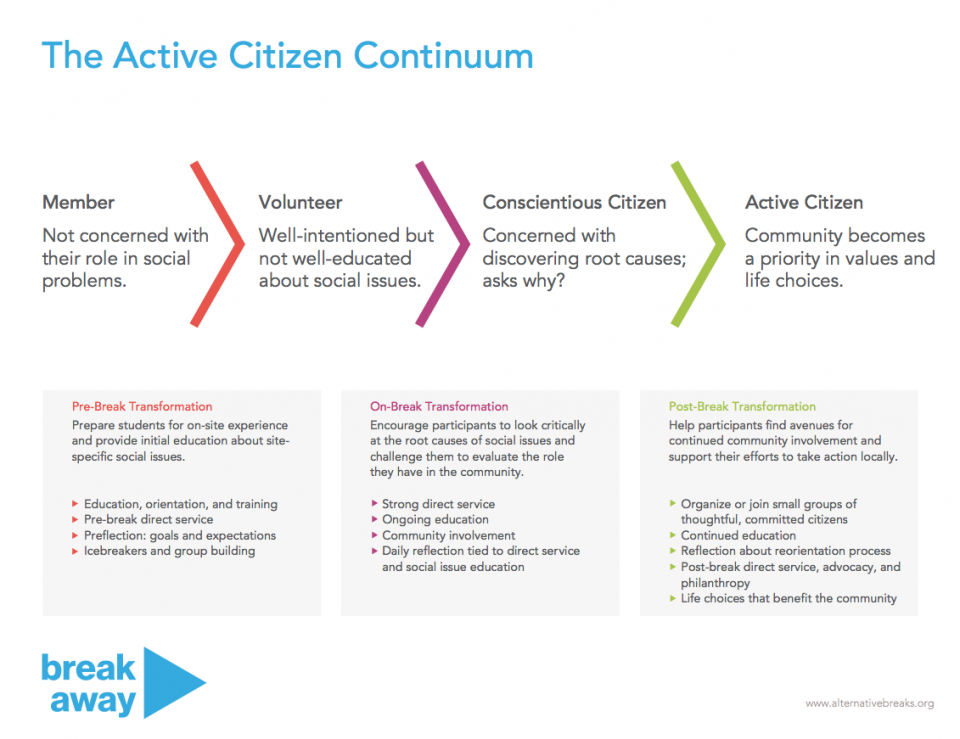Hurricane Harvey in Houston, TX. Hurricane Irma in the Caribbean. Hurricane Maria in Puerto Rico. Earthquakes in Mexico. Poverty. Hunger. Homelessness.
These are just a few of the issues that alternative break trip planning groups discussed throughout fall 2017, and will try to introduce their students to this spring. Does any of it actually matter?
This year, hundreds of thousands of students will depart their campuses for spring break, and while the media may tell us they’re all off to relax on a beach with a drink in hand, some of them will go on a short-term service trip.
These students have signed up to use their week off from classes and probably paid a fee ranging anywhere from $200 to over $1,000 to do volunteer work. They will do low-skill construction, sort items in food banks, or any of the many and varied projects that need volunteers. There’s a good number of conversations that exist about the role of these trips and the white-savior complex associated with them. Should we even have these trips?
As someone who coordinates these short-term service trips, I can share that there are times when I have gotten cynical about their role in higher education and society at large.
However, every year, without fail, I see the beauty of them. It comes from the stories and lessons students who have gone on our trips bring back with them. They share beautiful tales of the people they met, communities they fell in love with, and their passion for continuing to do their part.
We always see our students feel more connected to the university community as a result of participating in the program: Survey results indicate an increased understanding of their leadership style and essay answers explain their lifelong commitment to serving their local community.
And keeping this in mind reminds me that our service trips do matter.
It reminds me that we are not curing systemic poverty or rescuing any community. What these short-term service trips do is provide an opportunity for many students to gain a new perspective, to change their view of the world, to understand that there are larger issues at play when we talk about service to others.
Below are some tips to help prepare students for a short-term service trip.
1. Context of Trip
Why is the institution offering this trip? Why this location? Why are the students signing up to go?
These are just a few questions you should be answering to form the context of the short-term service trip. Sharing why the institution is supporting (and possibly subsidizing) the cost of the trip program will help inform the expectations of those participating.
These types of questions help your participants understand the context of the trip.
One simple way to communicate this is through the advertisement and pre-trip preparation process; rather than referring to the trips by their location, talk about them using their thematic or educational name (i.e. “the Ecological Restoration & Advocacy trip” vs. “the New Orleans trip”).
This simple switch changes the context of the trip, prioritizing the educational purpose over the location.
2. Role of Service
Asking what the role of your trip is in the lives of the volunteer participants, the community they’re heading to, and the larger world are great starting points for identifying the role of service. We begin to scrape the surface by acknowledging that there are a variety of motivations for a student, faculty, or staff members to sign-up to go on a weeklong service trip.
As a trip organizer I have to recognize that not every single person who applies is doing so with the same altruistic intent that I initially imagine them having as I craft the digital form application.
Service plays a wide variety of roles in people’s lives, and we have to recognize that this trip is simply one piece of their development along the Active Citizen Continuum.

This continuum from Breakaway demonstrates that short-term service trips help move our students and advisors from “member” or “volunteer” toward “conscientious citizen.” Knowing that this level of learning occurs (using our assessment results) it helps show that the role of service for everyone is ever-changing.
3. Reflection
This is where the magic truly happens — it is crucial that trip leaders are trained and comfortable in leading these types of conversations. There are a variety of reflection methods ranging from civic reflection to asking big questions, but whatever the style, these are the conversations on the trip that help the participants apply what they have learned.
Reflection should be a central part of every trip experience and should be so intrinsic to the trip culture that it is happening without anyone really knowing. Trip leaders should be advocates for reflection, and that can start with simply asking participants questions during the car ride to the destination. The culture of asking questions is imperative to the success of the trip, and advisors and student leaders shouldn’t be afraid to ask “Why did you choose this institution?” or other similar questions.
These types of questions, especially early in the process, will have a lasting impact on your service trip program and can lead to larger questions about the impact of service on larger societal issues.
4. Falling in Love
Remind students that their number one job on the trip is to fall in love with the community they are visiting – this idea comes from Rozella Haydee White, Houston City Director for Mission Year.
With this philosophy we should encourage participants engaging in short-term service to fall as deeply in love with the community they are serving. This means really getting to know the people, their stories, and listening with an open ear and heart.
This helps the participants truly see that the people in the community are human and will continue living there long after the service trip leaves at the end of the week.
So, does your service trip matter? These trips have the opportunity to have a life-changing impact on the students, faculty, and staff partaking in them. As trip organizers we have a responsibility to ensure that no harm is being done to the communities we are guests to. These communities should be receiving a helping hand not a burdensome mess they have to babysit. In order to ensure these trips matter, in a positive way, it is on us as trip organizers to work with community-based organizations to determine how our groups can do meaningful work and engage in intentional conversation with the local community.





